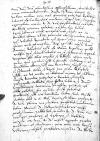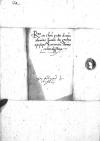Dicta testium accepi, in ⌊urbem⌋ mittam, cum certi hominis potestas dabitur. Litteras ad cardinales nondum scripsi. Ubi scripsero, exemplum earum Reverendissimae Dominationi Vestrae perferendum curabo. ⌊Syndicus⌋ minime optatum responsum tulit: excusationes eius acceptae non sunt ac in duabus etiam aliis privatis causis contra, quam ipse volebat, decretum est. Spero fore minus quam ante gloriosum. Dixi ego illi iussu ⌊reverendissimi domini⌋: delatum esse ad ⌊maiestatem regiam⌋, quod auctor ipse fuerit ⌊citatis⌋, ne se sisterent; negat umquam hoc illis consilii se dedisse, atque ante quam ipse accitus esset a ⌊senatu Gedanensi⌋ et in consilium admissus, iam decretum fuisse, ne sese sisterent. Scire se dixit, per quem delatus esset, ac ut coram ei obiceret cupere, ut saltem causae dicendae potestas ei daretur suique purgandi.
Allatae sunt hodie litterae a ⌊dominis consiliariis terrarum Prussiae⌋, quibus ab illis petitur hoc ipsum, quod petebat ⌊syndicus⌋, sed eae nondum lectae sunt. Quod factum erit a
s(erenissima) or s(acra)⌈s(erenissima)s(erenissima) or s(acra)⌉
⌊maiestate regia⌋, scribam postea Reverendissimae Dominationi Vestrae.
Plura me scribere prohibet oculorum dolor. Munus domini administratoris mihi gratissimum reddidit servitor Reverendissimae Dominationis Vestrae, cui iam egi gratias et referam, si dabitur occasio. A Vestra Reverendissima Dominatione nihil exspecto praeter gratiam et favorem, quae cum non deesse videam, nihil praeterea requiro. De ⌊Buda⌋  AAWO, AB, D. 19, No. 30_2 iam raucus factus est rumor. Vereor, ne vanum sit, quod ferebatur.
AAWO, AB, D. 19, No. 30_2 iam raucus factus est rumor. Vereor, ne vanum sit, quod ferebatur.
Deum precor, ut Reverendissimam dominationem Vestram diu servet incolumem. Cuius gratiae me commendo.
 AAWO, AB, D. 19, No. 30b_1
AAWO, AB, D. 19, No. 30b_1
Reverendissime Domine, domine colendissime.
Vladislaviensis episcopus dominus ⌊Dziergowski⌋, qui fuit Chelmensis; Chelmensis renuntiatus est dominus ⌊Dziiaduszki⌋, qui fuit Camienecensis; dominus ⌊Sebridowski⌋ canonicus Cracoviensis designatus est Camienecensis. Noster vero ⌊Praemisliensis⌋ multo istis dignior est repulsam passus. Mira nunc aguntur, quae scribere non licet, cum liceat tamen facere. Est hic dominus Maltzan, serenissimi domini Romanorum regis orator; obivit legationem publice de via in Silesiam, habuit aliam secretam. Est et ⌊Kerdey⌋ a ⌊caesare Turcarum⌋, adduxit camelos quinque, legatione nondum functus est. De saecularibus dignitatibus puto me iam scripsisse Reverendissimae Dominationi Vestrae. Hodie habebitur missa de Spiritu Sancto, hoc est pridie Calendas Februarii.
 AAWO, AB, D. 19, No. 30_2 iam raucus factus est rumor. Vereor, ne vanum sit, quod ferebatur.
AAWO, AB, D. 19, No. 30_2 iam raucus factus est rumor. Vereor, ne vanum sit, quod ferebatur.


